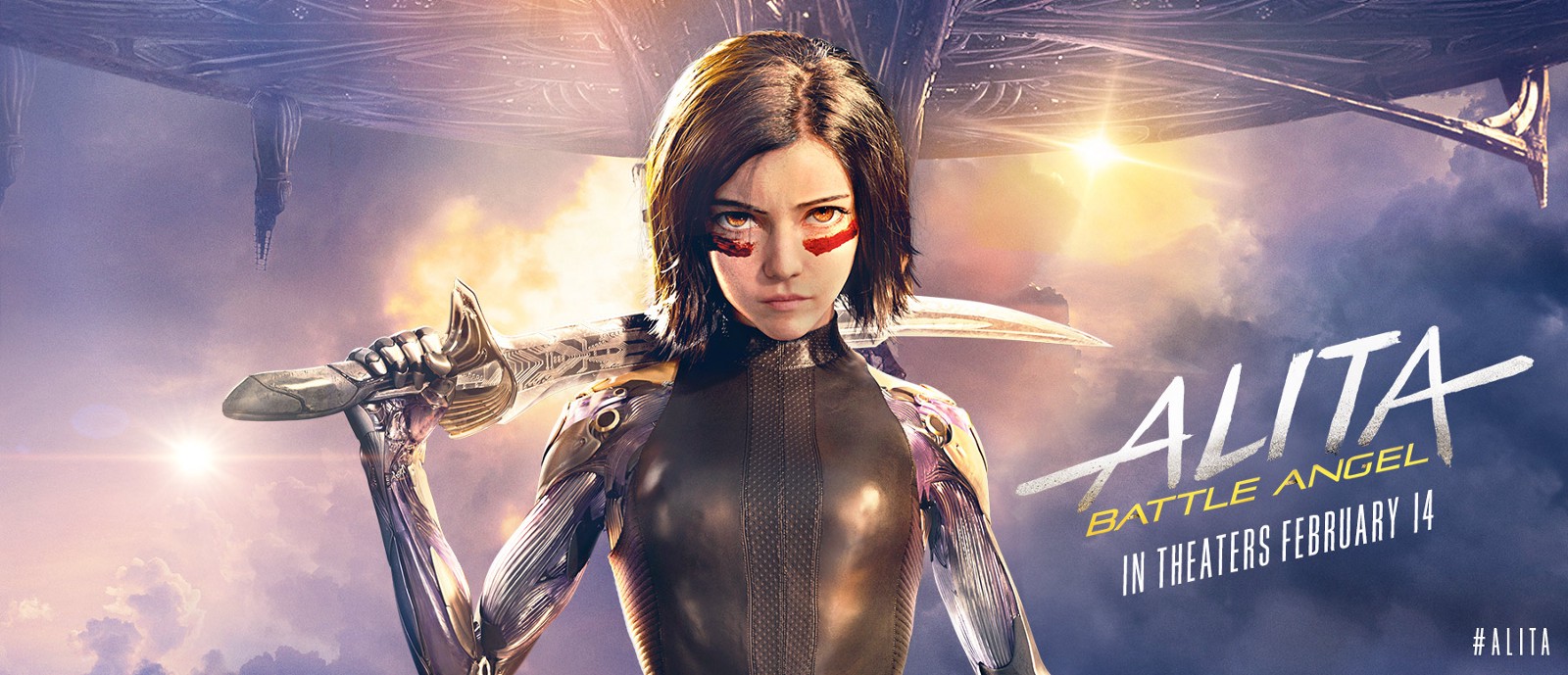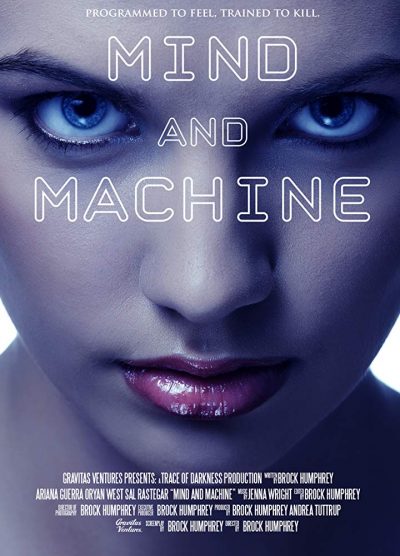 ★★★★
★★★★
“Mechanical Pixie Dream Girl.”
 Depending on your definition, this is perhaps the most expensive action-heroine film of all time, estimated at more than $200 million before tax incentives. Given the fate of live-action adaptations of manga in the West, most recently Ghost in the Shell, this was always going to be a risky investment, even with the name of James Cameron, the most successful movie-maker in history, attached as a producer. At one point, people were predicting a bomb of Mortal Engines size. While Alita seems to have escaped that fate, it’s going to have to do very well in both China and Japan, the two remaining territories, if it’s to turn any kind of profit, never mind start a franchise.
Depending on your definition, this is perhaps the most expensive action-heroine film of all time, estimated at more than $200 million before tax incentives. Given the fate of live-action adaptations of manga in the West, most recently Ghost in the Shell, this was always going to be a risky investment, even with the name of James Cameron, the most successful movie-maker in history, attached as a producer. At one point, people were predicting a bomb of Mortal Engines size. While Alita seems to have escaped that fate, it’s going to have to do very well in both China and Japan, the two remaining territories, if it’s to turn any kind of profit, never mind start a franchise.
 That’s a shame, because this is a solid, well-made piece of science-fiction, which does a particularly good job of creating a massive, epic world on the cinema screen. Rodriguez has been squeezing every penny out of his budgets since El Mariachi, and while there may not be much apparent overlap between Alita with Shark Boy and Lava Girl, the latter franchise was excellent training for RR in meshing computer graphics with actors. Sin City also laid similar groundwork, and helped set up the director with the chance to go big or go home. And there’s no doubt: Rodriguez went big. This was my first cinema trip of 2019, and was fully justified.
That’s a shame, because this is a solid, well-made piece of science-fiction, which does a particularly good job of creating a massive, epic world on the cinema screen. Rodriguez has been squeezing every penny out of his budgets since El Mariachi, and while there may not be much apparent overlap between Alita with Shark Boy and Lava Girl, the latter franchise was excellent training for RR in meshing computer graphics with actors. Sin City also laid similar groundwork, and helped set up the director with the chance to go big or go home. And there’s no doubt: Rodriguez went big. This was my first cinema trip of 2019, and was fully justified.
Having recently read the original manga, I was struck by how faithful the film was to most aspects. Right from the get-go, with Doc Ido (Waltz) finding the shattered remains of Alita (Salazar) on the scrap-heap below Zalem, there were shots which could have been story-boarded by the graphic novel. [Again, something Rodriguez also did in Sin City] Ido, in particular, looks exactly like I imagined him, and the same goes for Vector (Mahershala Ali), the shady power behind the scenes in Iron City, as well as Zapan and the rest of the bounty hunters.
The story is generally quite faithful, too. After her rescue, Alita tries to recover her past memories, becomes a bounty-hunter, falls in love with human boy Hugo (Johnson), takes up the brutal sport of Motorball, and experiences personal tragedy. However, the order of the events is shifted: in the manga, the tragedy is what spurs her entry into the Motorball arena. The film also adds Ido’s ex-wife, Chiren (Connolly), a character who was not in the comics, though does appear in the OVA. Here, they had a disabled daughter named Alita, who was killed by one of Ido’s Motorball goons. It’s a rather clunky subplot, which doesn’t add particularly much, beyond explaining from where Alita v2.0’s body came.
There has been much debate over Alita’s eyes, which have been CGI-increased in size to an extent rarely if ever seen in a live-action film. Of course, she’s a cyborg, so whatever. However, it is still something of a distraction, even though it appears they’ve been toned-down in size from early trailers, where it appeared her eyeballs would have occupied most of her brain’s frontal lobe. The eyes are one of the hardest things to get right with computer graphics, and when it isn’t, the results can be horrible, as with the resurrected Peter Cushing in Rogue One. This is better, and at some moments does enhance things, basically acting as a megaphone for Alita’s feelings. However, it also plays into the film’s main weakness: an apparent lack of genuine emotion. I’ll circle back to that a bit later.
As a spectacle, this is grand, offering sweeping vistas of a future world, densely populated with people, things and those in between. As an action movie, it works pretty well too. The two best set-pieces are the bar-brawl where newly-registered bounty hunter Alita proves her worth to her colleagues, and the Motorball game, where everyone else taking part cares only about killing Alita. There’s a palpable sense of progression in her skills over the course of the film. Initially, she’s clearly raw and unfocused, but after she is paired with her “berserker” body… [Inevitably, it has been the subject of PC whining, about it looking ‘too feminine’] Hoo-boy. By the end, she’s a weapon on mass destruction, regardless of the opponent’s size.
 And speaking of the end, one frequently-heard bit of criticism is that the ending is too “open,” apparently fishing for a sequel. I can’t say I felt that way at all. There’s certainly scope for more movies, apparently involving Alita going after the mysterious Nova. Yet the main thread of the film, involving Alita and Hugo, is definitively wrapped up. In comparison, say, to Marvel films, which almost inevitably have an in- or post-credit sequence blatantly signposting the next film, this felt conclusive. While there is perhaps need for a greater sense of escalation, or a bigger climax (that Motorball battle is trivial in its consequences), I’m largely baffled by complaints about the “lack of a genuine ending.”
And speaking of the end, one frequently-heard bit of criticism is that the ending is too “open,” apparently fishing for a sequel. I can’t say I felt that way at all. There’s certainly scope for more movies, apparently involving Alita going after the mysterious Nova. Yet the main thread of the film, involving Alita and Hugo, is definitively wrapped up. In comparison, say, to Marvel films, which almost inevitably have an in- or post-credit sequence blatantly signposting the next film, this felt conclusive. While there is perhaps need for a greater sense of escalation, or a bigger climax (that Motorball battle is trivial in its consequences), I’m largely baffled by complaints about the “lack of a genuine ending.”
As mentioned above, a more significant issue is that I hardly “felt” anything for any of the characters. Ido – stuck between paternal instincts of protection and a desire to allow Alita self-determination – perhaps came the closest. The relationship between Alita and Hugo is supposed to provide the film’s emotional engine. But between the former’s CGI make-up and the latter’s generic blandness, it doesn’t make much of a dent. There’s a scene where she literally tears out her heart and gives it to him: everyone, including the film itself, seems faintly embarrassed by the whole incident. Worse still – minor spoiler – the movie even goes so far as to kill a dog, without generating more than a blip of impact. Somewhere, John Wick shakes his head, sadly.
I was initially concerned about the PG-13 rating – not least because the first trailer before the film was for UglyDolls [an animated movie “about acceptance, diversity, joy and friendship” according to its site]. I needn’t have been: this is more From Dusk Till Dawn Robert Rodriguez than the Spy Kids version, with a gleeful approach to the semi-mechanized carnage. For I think it helps on the censorship front, that most of the carnage in inflicted on cyborgs, who are largely able to take a licking and keep on ticking. The manga was heavily into black market spine-ripping; here, it’s mostly limbs, which is slightly more kid-friendly, I guess.
In the end, this is just about everything for which I could have hoped. While I don’t necessarily agree with all of the artistic choices, the positives greatly outweigh the weaknesses. Although this is a low bar (hello, Speed Racer), it’s certainly the best manga/anime adaptation to come out of Hollywood. It’s a world I’d love to see explored further: whether Rodriguez and crew get the chance to do so or not, will remain in doubt until the final box-office figures arrive. Fingers crossed.
Dir: Robert Rodriguez
Star: Rosa Salazar, Christoph Waltz, Keean Johnson, Jennifer Connelly
 The first Giantess Attack! movie was an unexpected guilty pleasure: while obviously low budget, it had no pretensions and an undeniably goofy charm that, at least for me, helped paper over the cracks and microscopic resources. The end of it teased this very movie, and most of the main players have delivered on that promise. Can lightning strike twice? The answer is… not quite. Even at a crisp 67 minutes, it still feels like there is a lot of padding, with recycled footage and elements that go on, after their amusement value has expired. That said, it ends in another impressive giant battle, and still contains some genuinely amusing moments.
The first Giantess Attack! movie was an unexpected guilty pleasure: while obviously low budget, it had no pretensions and an undeniably goofy charm that, at least for me, helped paper over the cracks and microscopic resources. The end of it teased this very movie, and most of the main players have delivered on that promise. Can lightning strike twice? The answer is… not quite. Even at a crisp 67 minutes, it still feels like there is a lot of padding, with recycled footage and elements that go on, after their amusement value has expired. That said, it ends in another impressive giant battle, and still contains some genuinely amusing moments.




 A woman wakes up in a bedroom, with no knowledge of where she is, how she got there, or even who she is. Gradually, she (and the reader) find out the answers to at least some of those questions. Her name is Diya, and the bedroom is on Luna, which has now been settled and colonised by humanity. That’s the simple part. The rest? It’s complex. But is summary, she is a cyborg, created as part of a black budget research project by the NeuroDyne Corporation (Earth’s biggest employer – they basically own Iceland). An employee who had moral qualms about the scheme, smuggled Diya off-planet, stashing her with his blind sister Terry and a robot caregiver. But NeuroDyne aren’t letting their investment just walk away.
A woman wakes up in a bedroom, with no knowledge of where she is, how she got there, or even who she is. Gradually, she (and the reader) find out the answers to at least some of those questions. Her name is Diya, and the bedroom is on Luna, which has now been settled and colonised by humanity. That’s the simple part. The rest? It’s complex. But is summary, she is a cyborg, created as part of a black budget research project by the NeuroDyne Corporation (Earth’s biggest employer – they basically own Iceland). An employee who had moral qualms about the scheme, smuggled Diya off-planet, stashing her with his blind sister Terry and a robot caregiver. But NeuroDyne aren’t letting their investment just walk away. 

 In the second half of the 21st century, Japan closed its borders, after a schism between it and the rest of the world over the development of advanced androids by robotics pioneer Daiwa Heavy Industries, which the United Nations wanted stopped. For a decade no foreigner has been allowed in, and no-one knows what the country is now like. Then evidence arises that makes government agency SWORD embark on an “off the books” mission, to insert a team into Japan. It doesn’t go well, and before long the only member left active is Lt. Cdr. Vexille Serra (Kuroki). She discovers the country is now run by Daiwa, and things are… not what you’d expect. She links up with the head of the anti-Daiwa resistance, Maria (Matsuyuki). But time is running out for them, and the rebels are forced to mount a last-ditch attack on Daiwa’s island headquarters, in the hope of preventing a similar fate befalling the rest of the world.
In the second half of the 21st century, Japan closed its borders, after a schism between it and the rest of the world over the development of advanced androids by robotics pioneer Daiwa Heavy Industries, which the United Nations wanted stopped. For a decade no foreigner has been allowed in, and no-one knows what the country is now like. Then evidence arises that makes government agency SWORD embark on an “off the books” mission, to insert a team into Japan. It doesn’t go well, and before long the only member left active is Lt. Cdr. Vexille Serra (Kuroki). She discovers the country is now run by Daiwa, and things are… not what you’d expect. She links up with the head of the anti-Daiwa resistance, Maria (Matsuyuki). But time is running out for them, and the rebels are forced to mount a last-ditch attack on Daiwa’s island headquarters, in the hope of preventing a similar fate befalling the rest of the world. Originally a series of three novels by Tow Ubukata, then a manga series published from 2009-12, I can only presume that something was lost in the translation to these three short (~65 minutes each) movies. Actually, make that just about everything. For after a promising first entry, I can’t think of a franchise that fell so completely off the rails. Okay, maybe The Matrix, with which this shares similar problems: taking itself far too seriously, and diverting into social commentary for which no-one was asking. I gave serious consideration to bailing and make this a rare “Did not finish,” which I’d not even bother writing about. But perhaps if my experience can serve as a warning to others, the tedium will not have been experienced in vain.
Originally a series of three novels by Tow Ubukata, then a manga series published from 2009-12, I can only presume that something was lost in the translation to these three short (~65 minutes each) movies. Actually, make that just about everything. For after a promising first entry, I can’t think of a franchise that fell so completely off the rails. Okay, maybe The Matrix, with which this shares similar problems: taking itself far too seriously, and diverting into social commentary for which no-one was asking. I gave serious consideration to bailing and make this a rare “Did not finish,” which I’d not even bother writing about. But perhaps if my experience can serve as a warning to others, the tedium will not have been experienced in vain. Intelligence without morality to govern it, is psychopathy. So what happens when you create an intelligent machine, but deliberately avoid installing any kind of moral compass? It’s an interesting idea for a film. Not that you’d know it from this unconvincing effort, which sucks the potential out of it. In this near-future – it’s set in 2024, close enough to now, no actual work is required on the part of the makers – androids have become part of everyday society in many roles. Crime boss Isaac Lynch (Restegar) orders technician Leo Cameron (West) to make one without a conscience, so that it can be used as an assassin, saving those pesky hitman fees. Only Leo crafts the robot, Maya (Guerra), in the image of his late wife. On the plus side: he gets to see his wife again. On the other hand: she’s an amoral killer. Didn’t think that through too well, did he?
Intelligence without morality to govern it, is psychopathy. So what happens when you create an intelligent machine, but deliberately avoid installing any kind of moral compass? It’s an interesting idea for a film. Not that you’d know it from this unconvincing effort, which sucks the potential out of it. In this near-future – it’s set in 2024, close enough to now, no actual work is required on the part of the makers – androids have become part of everyday society in many roles. Crime boss Isaac Lynch (Restegar) orders technician Leo Cameron (West) to make one without a conscience, so that it can be used as an assassin, saving those pesky hitman fees. Only Leo crafts the robot, Maya (Guerra), in the image of his late wife. On the plus side: he gets to see his wife again. On the other hand: she’s an amoral killer. Didn’t think that through too well, did he? Space freighter pilot Jason (Sheridan) has his craft hijacked, and is forced to crash-land it on a deserted planet. Blinded and alone, things look grim for him, until he’s fortunate enough to be found by android Reyna (Guzzetta). She’s the product of a maverick genius, who took refuge on the planet, but recently died: she needs Jason, as the systems which power her require a human presence in order to operate. And he needs her – in particular, her advanced combat skills – in order to protect him, both from the planet’s hostile fauna, and the hijacker’s pals, who have followed him down to its surface. Yet, is Reyna entirely trustworthy?
Space freighter pilot Jason (Sheridan) has his craft hijacked, and is forced to crash-land it on a deserted planet. Blinded and alone, things look grim for him, until he’s fortunate enough to be found by android Reyna (Guzzetta). She’s the product of a maverick genius, who took refuge on the planet, but recently died: she needs Jason, as the systems which power her require a human presence in order to operate. And he needs her – in particular, her advanced combat skills – in order to protect him, both from the planet’s hostile fauna, and the hijacker’s pals, who have followed him down to its surface. Yet, is Reyna entirely trustworthy? ★★★★
★★★★ That’s a shame, because this is a solid, well-made piece of science-fiction, which does a particularly good job of creating a massive, epic world on the cinema screen. Rodriguez has been squeezing every penny out of his budgets since El Mariachi, and while there may not be much apparent overlap between Alita with Shark Boy and Lava Girl, the latter franchise was excellent training for RR in meshing computer graphics with actors. Sin City also laid similar groundwork, and helped set up the director with the chance to go big or go home. And there’s no doubt: Rodriguez went big. This was my first cinema trip of 2019, and was fully justified.
That’s a shame, because this is a solid, well-made piece of science-fiction, which does a particularly good job of creating a massive, epic world on the cinema screen. Rodriguez has been squeezing every penny out of his budgets since El Mariachi, and while there may not be much apparent overlap between Alita with Shark Boy and Lava Girl, the latter franchise was excellent training for RR in meshing computer graphics with actors. Sin City also laid similar groundwork, and helped set up the director with the chance to go big or go home. And there’s no doubt: Rodriguez went big. This was my first cinema trip of 2019, and was fully justified. And speaking of the end, one frequently-heard bit of criticism is that the ending is too “open,” apparently fishing for a sequel. I can’t say I felt that way at all. There’s certainly scope for more movies, apparently involving Alita going after the mysterious Nova. Yet the main thread of the film, involving Alita and Hugo, is definitively wrapped up. In comparison, say, to Marvel films, which almost inevitably have an in- or post-credit sequence blatantly signposting the next film, this felt conclusive. While there is perhaps need for a greater sense of escalation, or a bigger climax (that Motorball battle is trivial in its consequences), I’m largely baffled by complaints about the “lack of a genuine ending.”
And speaking of the end, one frequently-heard bit of criticism is that the ending is too “open,” apparently fishing for a sequel. I can’t say I felt that way at all. There’s certainly scope for more movies, apparently involving Alita going after the mysterious Nova. Yet the main thread of the film, involving Alita and Hugo, is definitively wrapped up. In comparison, say, to Marvel films, which almost inevitably have an in- or post-credit sequence blatantly signposting the next film, this felt conclusive. While there is perhaps need for a greater sense of escalation, or a bigger climax (that Motorball battle is trivial in its consequences), I’m largely baffled by complaints about the “lack of a genuine ending.”
